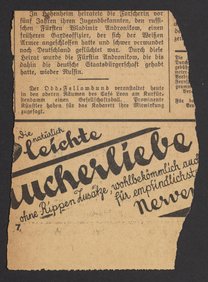Oral history interview with Madeleine Jacobs
- 2009-May-28

Madeleine Jacobs grew up in Washington, D.C., the younger of two children. Her father was a musician, her mother a secretary. The television program Watch Mr. Wizard convinced her she wanted to be a scientist, in particular a chemist. Jacobs went to school in the wake of Sputnik, during which time there was much more support and better resources for education generally, and science education specifically. Jacobs feels that she had very good teachers and classes throughout junior and senior high school. Her parents were supportive of her ambition to pursue science, and she always earned top grades in all her subjects.
Jacobs submitted a limited number of college applications, largely because the cost of applying to colleges put a strain on her middle-class family. She matriculated into George Washington University with a full scholarship. She found the professors involved and engaging and loved her experiences there; her summer work to earn money at a government agency involved studying lipid transport in cockroaches. She married after college, planning to enter Stanford University’s PhD program in chemistry, but her husband had been drafted, and they had to spend two years in Washington, DC. Jacobs began a master’s program at the University of Maryland, but she quit after a year. She had always loved writing and wrote extremely well, so she applied for a job with Chemical & Engineering News (C&EN). At C&EN, she became interested in gender equality of chemists, in particular the disparity between the salaries of women and men chemists. This interest in gender equality has lasted her entire life.
Initially, Jacobs worked in Washington, DC, and continued working for C&EN when she moved to California with her husband. After six months in California, she left to return to DC, where she worked for C&EN for two more years. After a short stint as a writer at National Institutes of Health, she spent five years as a science writer, and then became head of media relations and publications at the National Bureau of Standards. From that position, Jacobs’ career took her to the Smithsonian Institution’s Office of Public Affairs, beginning as science writer and ending as its Director. At this job, she became interested in attracting diverse audiences to the museums. During her time at the Smithsonian, the slogan, “The Smithsonian is for everyone” was coined. When she left there, she was awarded the Secretary’s Gold Medal for her efforts in outreach, especially to underrepresented peoples.
After fourteen years at the Smithsonian, Jacobs returned to C&EN to become managing editor. After one and a half years, she became editor-in-chief, a title she held for eight and a half additional years. At C&EN, she reawakened her interest in women in chemistry. She initiated “The Scorecard” to document the progress of women on chemistry faculties. Finding this scorecard effective in making faculties sit up and take notice on the disparity between the number of male and female professors, she began a scorecard for industry.
After ten years at C&EN, Jacobs became the first woman and first person without a PhD to become Chief Executive Officer of the American Chemical Society (ACS), the position she holds today. Her responsibilities include running a staff of two thousand people, including the ACS scientific publishing operations, Chemical Abstracts Service and ACS Publications; serving on the ACS Board of Directors; fundraising; and outreach to universities, government, industry, and the nonprofit world. She continues her interest in promoting gender equality and minority representation. She sees science education and literacy as a path to improvement of everyone’s life.
Access this interview
By request 1 PDF Transcript File and 4 Audio Recording Files
Fill out a brief form and a staff member will review your request for these files. You should receive an email within 3 business days.
Usage is subject to restrictions set by the interviewee.
If you have any questions about transcripts, recordings, or usage permissions, contact the Center for Oral History at oralhistory@sciencehistory.org.





